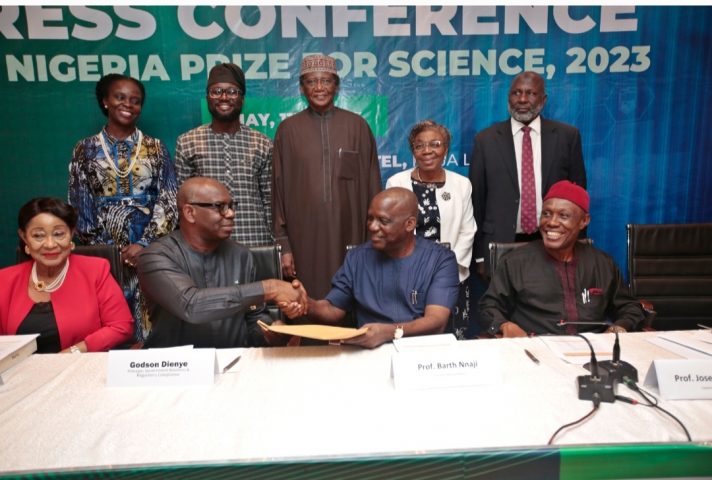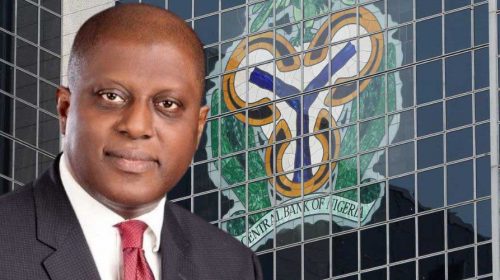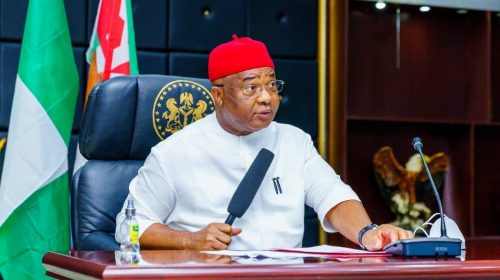Nigeria Prize for Science nets 100 entries for 2023 cycle

Nigeria LNG Limited (NLNG) has received 100 entries from across the globe for the 2023 iteration of The Nigeria Prize for Science.
The $100,000 Prize maintains the heightened level of interest experienced in 2022 when about 107 entries was received. The 2023 entries will compete for the best “Innovation for Enhancement of Healthcare Therapy,” a theme adopted by the Advisory Board of the Prize for this year’s competition.
The number of entries was revealed today in Lagos at the ceremony to hand over the entries to judges for the commencement of the adjudication process. NLNG’s General Manager for External Relations and Sustainable Development, Mr Andy Odeh, represented by the Manager, Government Relations, Godson Dienye, handed over the entries to the Chair of the Prize’s Advisory Board, Professor Barth Nnaji, who, in turn, handed over the entries to the judges.
Professor Joseph Ahaneku chairs the panel of judges for this year’s competition. Professor Ahaneku is a Professor of Chemical Pathology at the Nnamdi Azikiwe University, Awka, Anambra State. He is the first black and African scientist to receive the Science and Technology Agency (STA) of Japan Foreign Researcher of the Year under Japan’s Research Development Cooperation (RDC). Professor Ahaneku is a member of the Executive Council of the Nigerian Academy of Science, Chairman Basic Clinical Science section of the Academy of Medicine Specialties of Nigeria, and Vice-President of the Academy of Medicine Specialties of Nigeria.
Other panel members include Professor Olaitan Alice Soyannwo and Professor Abdullahi A. Abba. Professor Soyannwo is a professor of Anaesthesia. She has made great strides in her focus area of effective pain management. She has served as a member of the National Cancer Consultative Committee that drafted the first National cancer guidelines with palliative care as one of the goals in 2007. She is a pioneer member of the board of trustees of the Hospice and Palliative Care Association, Nigeria (HPCAN) and the brain behind a non-profit organisation, Centre for Palliative Care Nigeria (CPCN), that collaborated with the University College Hospital, Ibadan, to establish the first palliative care unit at the hospital in 2007, the first of such in a tertiary institution in Nigeria.
Professor Abba is a Professor of Medicine and Pulmonology at Ahmadu Bello University, Samaru, Zaria and a Chief Consultant Physician at Ahmadu Bello University Teaching Hospital, Shika, Zaria. A founding member of the Department of Medicine at University of Maiduguri Teaching Hospital, Professor Abba worked as a Senior Registrar at King Khalid University Hospital and as an Associate Professor at King Saud University, Riyadh, Saudi Arabia. In these capacities, he headed the largest Clinical Teaching Unit in the Middle East at King Saud Medical City, Riyadh, for over a decade.
Speaking on the entries received for the 2023 edition of the Prize, Mr Odeh stated that the theme of this year’s competitions sits comfortably with the Company’s health-themed projects, including previous COVID-19 intervention projects and its Hospital Support Programme, which focuses on increasing capacity in 12 teaching hospitals across the nation geopolitical zones.
“As we all know, the world is facing unprecedented challenges in healthcare. The COVID-19 pandemic has brought to the fore the importance of innovative solutions to address some of the most pressing healthcare issues facing us today. The Nigeria Prize for Science recognises the crucial role of science and technology in the quest for better healthcare outcomes for our people.
“The Nigeria Prize for Science has always been about promoting excellence in scientific research and encouraging innovation. We believe that by recognising and rewarding outstanding scientific achievements, we can inspire others to pursue a career in science and help drive progress in our society,” he said.
In his remarks, Professor Nnaji emphasised that the Advisory Board was excited to receive entries from some of the best minds in the field, both within Nigeria and beyond. He stated that the competition can help improve the healthcare system in the country.
“Confidence and trust in the selection and judgement protocols have grown. The result of this is a new wave of popularity of the Prize among Nigerian scientists and a surge in the pull and push to innovate for excellence. When we talk and think about excellence and its place in the administration of this prize, great kudos must go to the Nigeria LNG team. The level of resources far beyond the prize money invested on this prize by the company reinforces its avowed commitment to the development of our country. Our dream of success in national development cannot be realised outside the compass of science and innovation. It takes a forward-looking company to realise this, to pursue it for almost two decades and to sustain it with pride and confidence,” he said,
Other members of the Advisory Board are Chief Dr Nike Akande, a two-time minister and former President of Lagos Chamber of Commerce and Industry; and Professor Yusuf Abubakar, a professor of Animal Breeding and Quantitative Genetics and the Coordinator of Agriculture Group, R & D Standing Committee, at the Tertiary Education Trust Fund.







Leave a Reply